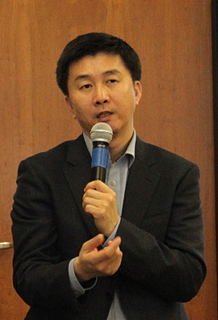A Quote by Noah Feldman
In 1953, after the armistice ending the Korean War, South Korea lay in ruins. President Eisenhower was eager to put an end to hostilities that had left his predecessor deeply unpopular, and the war ended in an uneasy stalemate.
Related Quotes
South Korea at the end of the Second World War had a very low level of literacy. But suddenly, like in Japan, they determined they were going in that direction. In 20 years' time, they had transformed themselves. So when people go on saying that it's all because of perennial culture, which you cannot change, that's not the way the South Korean economy was viewed before the war ended. But again within 30 years, people went on saying there's an ancient culture in Korea that has been pro-education, which is true.
China is ruthlessly pragmatic. It supports North Korea for its own selfish interests. And I believe that China no longer considers us an ally. The current president, Xi Jinping, cultivates close relations with South Korea. He has never met with me, the leader of North Korea, something that the leader of China has always done. At the grand celebrations in Beijing two years ago commemorating the 70th anniversary of the end of World War II, he placed the president of Russia and the president of South Korea at his side. In North Korea, we pay a lot of attention to ceremonies and what they signal.
I think the regime in North Korea is more fragile than people think. The country's economic system remains desperate, and one thing that could happen for example would be under a new government in South Korea, to get the South Korean government to live up to its own constitution, which says any Korean who makes it to South Korea, is a Korean citizen. A citizen of the Republic of Korea. And you could imagine the impact that would have inside North Korea if people thought, "If I could get out and make it to South Korea, I could have a different life."
Yes, Obama took over two wars from Bush - just as President Richard Nixon inherited Vietnam from President Lyndon Johnson and President Dwight Eisenhower inherited Korea from President Harry Truman. But at least the war in Iraq was all but won by 2009, thanks largely to the very surge Obama had opposed as a senator.
In contrast, Western historians, and those in South Korea, say the North attacked the South on June 25, 1950. Both sides agree that after the war began, the North Korean Army captured Seoul in three days and pushed as far south as Pusan before American troops arrived to drive back the North Koreans nearly as far north as the border to China.
It will begin with its President taking a simple, firm resolution. The resolution will be: To forego the diversions of politics and to concentrate on the job of ending the Korean war-until that job is honorably done. That job requires a personal trip to Korea. I shall make that trip. Only in that way could I learn how best to serve the American people in the cause of peace. I shall go to Korea.



































